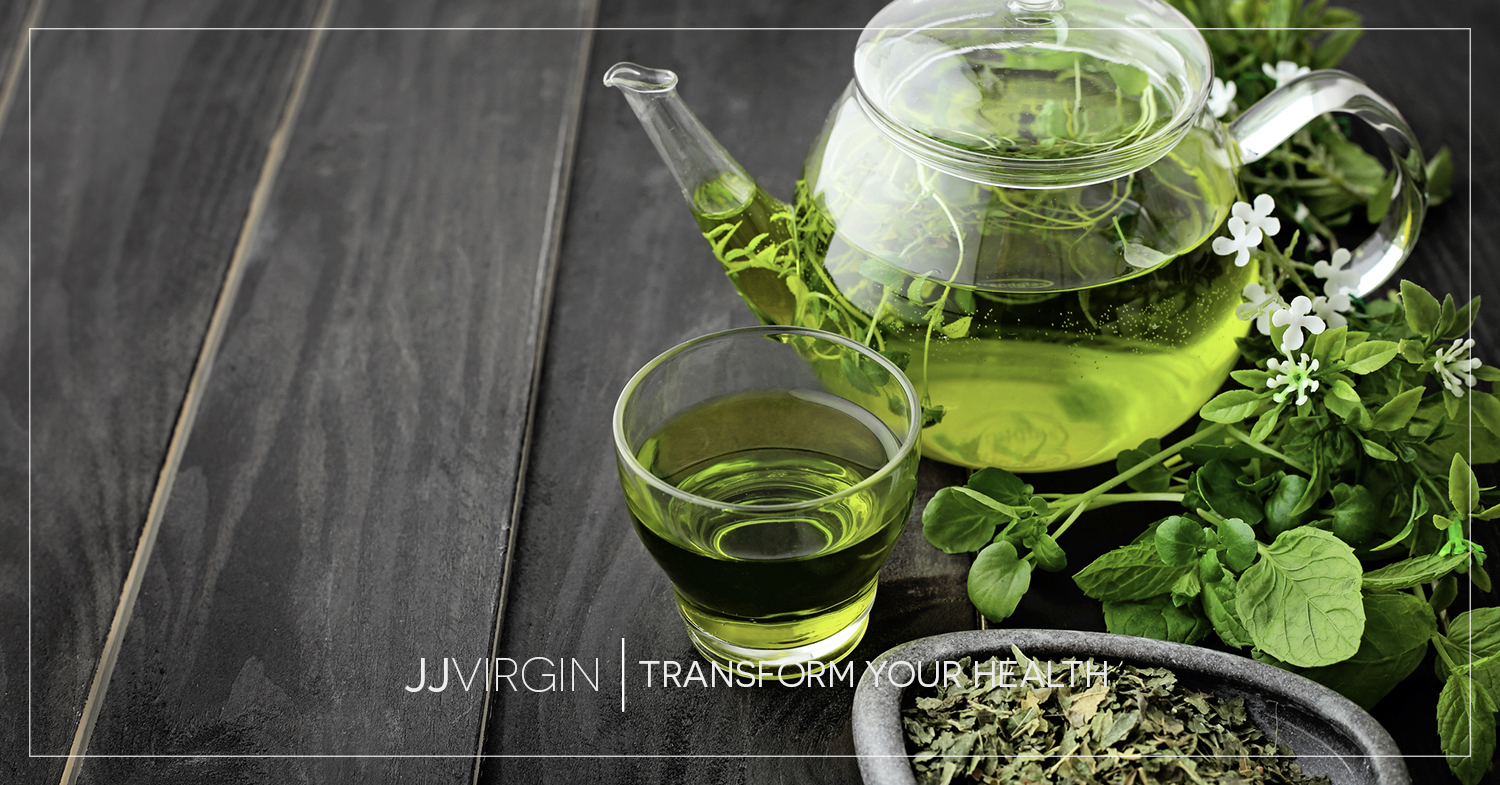Put a dozen health experts into a room and while they’ll have plenty to debate, my bet is that every person will agree that green tea is a powerhouse beverage. And for good reason: green tea has a stellar reputation for reducing the risk of heart disease and cancer, boosting brain function, and promoting overall health.
Green tea contains more health-boosting antioxidants (called catechins) than other teas, including black tea. The most abundant (and most-studied) catechin is epigallocatechin-3-gallate, but we’ll just call it EGCG.1
Human studies suggest that EGCG and other compounds in green tea may help reduce the risk of cardiovascular disease and some forms of cancer. Drinking green tea may also support healthy blood pressure, increase bone mineral density, protect your brain, and much more.
And then, there’s weight loss. When you’re eating by the plate and making smart lifestyle choices, research shows that regularly drinking green tea can give the scales a favorable nudge.2
How? EGCG and other antioxidants can increase your body's ability to burn fat by boosting enzyme activity. These enzymes are responsible for breaking down fat and decreasing how much fat your body absorbs from food.3
Those catechins (along with the caffeine in green tea) can also increase your feelings of fullness, putting the brakes on the urge to snack and reach for seconds.4
Those are the reasons why green tea has been part of my daily routine for decades. In fact, I drink 32 ounces daily! Hot or iced, unsweetened or with a little monk fruit, splashed with coconut milk… any way that you drink it, green tea is a fantastic beverage.
5 Ways Green Tea Helps You Lose Weight
1. Green Tea Curbs Your Appetite
When you’re trying to lose weight, hunger and cravings can easily derail your best efforts. Sipping green tea throughout the day is a simple way to keep your appetite under control.
One 12-week study among obese women found using high-dose green tea extract (GTE) created significant weight loss, reduced waist circumference, and improved lipid levels.
One reason for those impressive benefits? Green tea positively impacts your hunger-regulating hormones, including ghrelin and leptin. As a result, your brain gets the message that you’re full more quickly.5
Worth noting: many studies like this use GTE to study the therapeutic benefits of green tea. One cup of green tea is equivalent to 50-100 mg of green tea extract. These women were getting a daily dosage of 856.8 mg of GTE, which would be about eight to 16 cups of green tea.
Every serving of Metabolic Reset™ contains 300 mg of green tea extract, to help you reach your weight loss goals faster. This powerful, synergistic, science-based blend of vitamins, minerals, and plant extracts helps promote fat metabolism, lean body mass, blood sugar balance, and normal appetite. And it’s included in my Metabolism Rescue Program along with a comprehensive guide, exclusive masterclass, and curated supplement kit. Learn more here.
2. Green Tea Boosts Your Metabolism
The catechins in green tea (along with its caffeine) can boost your metabolism, or the number of calories your body utilizes for energy. Green tea can also help your body break down fat, which increases the amount of energy your body uses.6
How much of these metabolic-boosting effects come from catechins versus caffeine? That was the question posed in one study, where 10 healthy men were randomly assigned to have green tea extract (50 mg caffeine and 90 mg EGCG), caffeine alone (50 mg), or a placebo, which they consumed at breakfast, lunch, and dinner.
The green tea group was the winner. Researchers found that the extract increased thermogenesis (how many calories you burn for energy) and fat-burning beyond what its caffeine would create.7
In other words, while caffeine can give your metabolism a nudge, the catechins in green tea seem to provide most of the metabolic heavy lifting. Overall, research shows that drinking therapeutic amounts of green tea (or taking a supplement containing GTE or EGCG) can help you burn about 60–80 calories a day.8
Learn 5 ways to increase your metabolism and boost fat loss in this blog.
3. Green Tea Lowers Inflammation
Chronic inflammation has been linked to nearly every disease on the planet, including cancer, heart disease, diabetes, and obesity.9 Research shows that it can also make weight gain easier and weight loss more difficult.
Why? This simmering, low-grade inflammation locks the doors on your fat cells, so your body can’t access that fat for energy. Chronic inflammation can also increase your risk of insulin resistance, type 2 diabetes, and cardiovascular disease.10
Researchers credit green tea and EGCG with providing those anti-inflammatory effects by suppressing inflammation-causing enzymes and signaling molecules.11
4. Green Tea Can Support Gut Health
The trillions of bacteria housed within your gut can influence how easily you lose weight and keep it off.
Maintaining the right balance among these bacteria—a balance between good and bad bacteria, but also diversity among them—can support a healthy weight. When quantity or quality falls out of balance, you’re more likely to struggle with weight loss.12
Read more about how healing your gut can impact weight loss in this Medium article.
Green tea can influence the growth of healthy bacteria in the gut and stop the development of the bad kind. As a result, green tea may help support the balance of gut flora that positively impacts your weight and overall health.13
Research shows that the catechins in green tea have prebiotic activity as well. Prebiotics are foods for probiotics: this type of fiber can keep those trillions of gut bacteria in balance. This helps nourish and encourage growth of healthy gut bacteria, such as Akkermansia muciniphila (Akkermansia), a strain that researchers find plays a role in healthy weight.14
5. Green Tea Can Help You Feel Calm
Think about your most hectic day. If you’re like most people, you may feel more tempted to reach for a croissant with your morning coffee or a sugary treat from that new bakery. Conversely, when you’re feeling calm, you’re more likely to bypass these temptations.
Again, green tea can help, thanks to L-theanine. This amino acid supports the release of a neurotransmitter called GABA, which tends to calm down the brain. L-theanine also triggers the release of dopamine, a brain chemical connected with well-being.15
Take Ten Stress Support is a uniquely formulated product that provides gamma-aminobutyric acid (GABA), a key neurotransmitter for a normal, calm stress response. We’ve also added other calming nutrients including glycine, niacinamide, pantothenic acid, and vitamin B6.* You can only order Take Ten Stress Support here.
Final Thoughts
While I’m very careful about overhyping certain foods and beverages, green tea truly earns its reputation for its weight loss benefits. To get its many perks, drink organic green tea unsweetened or with a tiny amount of stevia or monk fruit and/or unsweetened coconut milk if you need it.
Green tea has less caffeine than coffee: an 8 oz cup has about 30 to 50 mg of caffeine, compared to 80 to 100 mg of caffeine in the same size of coffee. If you’re a slow metabolizer (in other words, it takes longer for your liver to metabolize caffeine) or you’re otherwise sensitive to caffeine, look for an organic decaffeinated green tea.
Finally, I’ve got a few green tea-based recipes sure to delight your taste buds and help you get more of green tea’s health benefits:
- Superfood Iced Tea
- Peach & Mint Iced Green Tea
- Metabolism-Boosting Arnold Palmer
- Chai Green Tea With Whipped Coconut Cream
- Coco-Vanilla Matcha Shake
The views in this blog by JJ Virgin should never be used as a substitute for professional medical advice. Please work with a healthcare practitioner concerning any medical problem or concern. The information here is not intended to diagnose, treat, or prevent any disease or condition. Statements contained here have not been evaluated by the Food and Drug Administration.
*These statements have not been evaluated by the Food and Drug Administration. This product is not intended to diagnose, treat, cure, or prevent any disease.
References:
- Reygaert WC. Green Tea Catechins: Their Use in Treating and Preventing Infectious Diseases. Biomed Res Int. 2018 Jul 17;2018:9105261. doi: 10.1155/2018/9105261. PMID: 30105263; PMCID: PMC6076941.
- Cabrera C, Artacho R, Giménez R. Beneficial effects of green tea–a review. J Am Coll Nutr. 2006 Apr;25(2):79-99. doi: 10.1080/07315724.2006.10719518. PMID: 16582024.
- Hodgson AB, Randell RK, Jeukendrup AE. The effect of green tea extract on fat oxidation at rest and during exercise: evidence of efficacy and proposed mechanisms. Adv Nutr. 2013 Mar 1;4(2):129-40. doi: 10.3945/an.112.003269. PMID: 23493529; PMCID: PMC3649093.
- Carter BE, Drewnowski A. Beverages containing soluble fiber, caffeine, and green tea catechins suppress hunger and lead to less energy consumption at the next meal. Appetite. 2012 Dec;59(3):755-61. doi: 10.1016/j.appet.2012.08.015. Epub 2012 Aug 23. PMID: 22922604.
- Chen IJ, Liu CY, Chiu JP, Hsu CH. Therapeutic effect of high-dose green tea extract on weight reduction: A randomized, double-blind, placebo-controlled clinical trial. Clin Nutr. 2016 Jun;35(3):592-9. doi: 10.1016/j.clnu.2015.05.003. Epub 2015 May 29. PMID: 26093535.
- Westerterp-Plantenga MS. Green tea catechins, caffeine and body-weight regulation. Physiol Behav. 2010 Apr 26;100(1):42-6. doi: 10.1016/j.physbeh.2010.02.005. Epub 2010 Feb 13. PMID: 20156466.
- Dulloo AG, Duret C, Rohrer D, Girardier L, Mensi N, Fathi M, Chantre P, Vandermander J. Efficacy of a green tea extract rich in catechin polyphenols and caffeine in increasing 24-h energy expenditure and fat oxidation in humans. Am J Clin Nutr. 1999 Dec;70(6):1040-5. doi: 10.1093/ajcn/70.6.1040. PMID: 10584049.
- Pahwa R, Goyal A, Jialal I. Chronic Inflammation. [Updated 2022 Aug 8]. In: StatPearls [Internet]. Treasure Island (FL): StatPearls Publishing; 2022 Jan-. Available from: https://www.ncbi.nlm.nih.gov/books/NBK493173/
- Ohishi T, Goto S, Monira P, Isemura M, Nakamura Y. Anti-inflammatory Action of Green Tea. Antiinflamm Antiallergy Agents Med Chem. 2016;15(2):74-90. doi: 10.2174/1871523015666160915154443. PMID: 27634207.
- Aoun A, Darwish F, Hamod N. The Influence of the Gut Microbiome on Obesity in Adults and the Role of Probiotics, Prebiotics, and Synbiotics for Weight Loss. Prev Nutr Food Sci. 2020 Jun 30;25(2):113-123. doi: 10.3746/pnf.2020.25.2.113. PMID: 32676461; PMCID: PMC7333005.
- Pérez-Burillo S, Navajas-Porras B, López-Maldonado A, Hinojosa-Nogueira D, Pastoriza S, Rufián-Henares JÁ. Green Tea and Its Relation to Human Gut Microbiome. Molecules. 2021 Jun 26;26(13):3907. doi: 10.3390/molecules26133907. PMID: 34206736; PMCID: PMC8271705.
- Jeong HW, Kim JK, Kim AY, Cho D, Lee JH, Choi JK, Park M, Kim W. Green Tea Encourages Growth of Akkermansia muciniphila. J Med Food. 2020 Aug;23(8):841-851. doi: 10.1089/jmf.2019.4662. Epub 2020 Jun 25. PMID: 32598202.
- Bowden, Jonny. The 150 Healthiest Foods on Earth. MA: Fair Winds Press; Revised edition (August 29, 2017).





